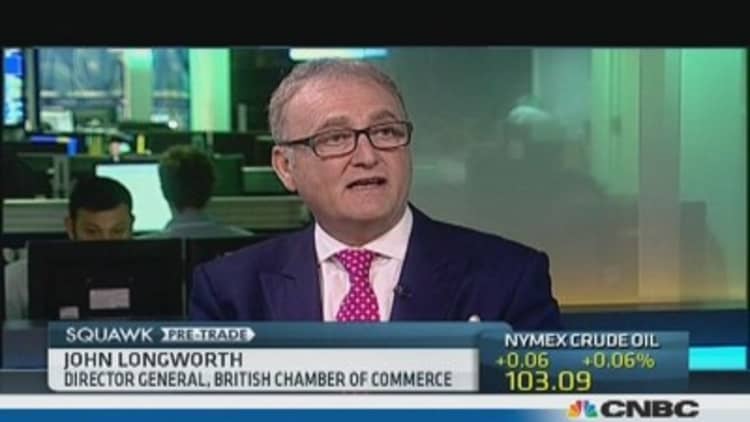
Despite increasingly strong U.K.growth forecasts and increases in business confidence, house prices and employment data, the head of the British Chambers of Commerce (BCC) warned against the beguiling effect of government schemes to boost the economy, calling them "weapons of mass distraction".
In its quarterly economic survey report, the BCC said on Tuesday that there had been a strong performance in both the manufacturing service sectors in the third quarter and forecast a rise of around 1 percent in the U.K's gross domestic product as a result.
The director general of the BCC told CNBC that while the results were "very encouraging," the U.K. was not "out of the woods" yet.
The U.K. economy has recorded two solid rises in gross domestic product over the first and second quarters of the year and is forecast to grow around 1.5 percent in 2013, according to analysts.
On Tuesday, the International Monetary Fund upped its U.K. growth forecast to 1.4 percent this year and 1.9 percent next.
(Read more: IMF cuts growthforecast for emerging world)
"One swallow doesn't make a summer," John Longworth told CNBC Europe's "Squawk Box" on Tuesday following the survey's publication. "In the past, we've seen a boost followed by a pullback in the subsequent quarter but this time that hasn't happened, which means that we're seeing an easing up of access to finance and cash flow is still not at pre-recession levels, so we're not out of the woods yet."
The survey, collated from the responses of over 7,000 businesses in the U.K., showed that business confidence had also translated into a 20 percent rise in employment in the services sector in the third quarter to its best level since 2007.
(Read more: UK recovery goes from strength to strength)
The data was backed up by other research released Tuesday,showing there had been a "marked" increase in permanent and temporary job placements in the U.K. in September, the Recruitment and Employment Confederation (REC) and KPMG's jobs report showed.
The rise in business confidence and employment follows attempts by the U.K. government to encourage banks to get lending to businesses and the public in its efforts to revive the U.K. economy.
The government initiatives include schemes such as "Funding for Lending" and the "Help to Buy" home-buyers' program, of which an updated version was launched on Tuesday. Under the home buyers' scheme, the government will guarantee part of a home-buyer's mortgage on properties worth up to £600,000 ($918,000).
Although concerns have grown that the schemes could create another housing and credit bubble, the government has said the initiatives have helped contribute to a nascent recovery in the U.K. economic confidence.
British house prices rose at their fastest rate in 11 years in September and sales hit a four-year high, a survey by the Royal Institution of Chartered Surveyors showed on Tuesday, highlighting a sustained recovery in the property market and concerns of a bubble.
With the rate of home building failing to catch up with the rate of price increases, however, Longworth warned that the "Help to Buy" scheme to assist home buyers could actually do more damage to the economy than good.
(Read more: Bank of England 'vigilant' on UK house prices)
"It's no panacea and these things, if you're not careful,are political weapons of mass distraction to get people's minds off the things that actually matter and getting them to vote for the government…If you don't actually build the houses that people can buy, you just stoke up price increases of the property we already have - now what's the value to the economy of doing that?"
Despite growing economic confidence and reassurances by the Bank of England that interest rates will not rise anytime soon, consumers are still wary of spending money in the retail sector, however.
Consumer confidence seemed to take a dip in September as retail sales slowed for a second consecutive month and showed a longer negative trend. Like-for-like sales were up 0.7 percent from September 2012, the British Retail Consortium's report said, when they had increased 1.5 percent on the preceding year.
While David McCorquodale, the head of retail at KPMG, which compiled the data with the BRC, called the figures "a reality check" that would make retailers nervous in the run up to Christmas, the BCC's Longworth said that retail sales growth could be a false friend in terms of economic growth anyway.
"Certainly what we don't want is a consumer boom-led growth pattern, what we need is solid good growth and that sort of growth comes from exports, infrastructure investment and manufacturing and production and the building of businesses."
"This is a really dangerous time in the recovery. What always happens in these situations is that politicians say 'phew, we're out of the woods now' and think of things to spend money on. Over the next few years, they need to put the economy front and center of politics."
- By CNBC's Holly Ellyatt, follow her on Twitter @HollyEllyatt


